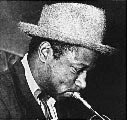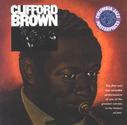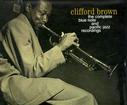
Clifford Brown on Trumpet at the Jazznote
Like contemporary and mentor, Fats Navarro, Clifford "Brownie" Brown had a warm fat tone and boppish articulation, and likewise, was cut down at a tragically early age. But unlike Navarro, Brown was safeguarded a place amongst the immortals of jazz trumpet thanks to a short but prolific recording career thankfully still in print for the most part.
 Born October 30, 1930 in Wilmington Delaware, Clifford "Brownie" Brown started on his instrument at 15 when his father gave him a trumpet. The high school band director, Harry Andrews, recognized Brown's innate affinity for the trumpet and provided initial encouragement in the context of the school band as well as private tutoring. Clifford continued his studies in jazz harmony, theory, trumpet, piano, vibes, and bass with Robert Lowery in Wilmington and was gigging regularly in Philadelphia by age 18. Fats Navarro became his mentor around this time. During this time he also performed with the likes of Dizzy Gillespie, Charlie Parker, and Miles Davis, who would provide both influence and encouragement. Winning a scholarship to study at Maryland State College in 1949 he continued his musical studies and wrote arrangements for the college band until a near-fatal automobile accident hospitalized Brown from June 1950 until May of 1951.
Born October 30, 1930 in Wilmington Delaware, Clifford "Brownie" Brown started on his instrument at 15 when his father gave him a trumpet. The high school band director, Harry Andrews, recognized Brown's innate affinity for the trumpet and provided initial encouragement in the context of the school band as well as private tutoring. Clifford continued his studies in jazz harmony, theory, trumpet, piano, vibes, and bass with Robert Lowery in Wilmington and was gigging regularly in Philadelphia by age 18. Fats Navarro became his mentor around this time. During this time he also performed with the likes of Dizzy Gillespie, Charlie Parker, and Miles Davis, who would provide both influence and encouragement. Winning a scholarship to study at Maryland State College in 1949 he continued his musical studies and wrote arrangements for the college band until a near-fatal automobile accident hospitalized Brown from June 1950 until May of 1951.
From R&B to the Classics--Brown on Record
1952 (March 21) saw Brown make his recording debut with the R&B group Chris Powell's Blue Flames with whom he played trumpet and piano (1952-'53).
From August to December Brown was with Lionel Hampton's band, touring Europe and North Africa as well as leading the now-famous Paris recording sessions (September 28 - October 11, 1953) despite Hampton's strict recording restrictions. These sessions are fortunately available on three CD's as Clifford Brown Big Band, Clifford Brown Quartet, and Clifford Brown Sextet in Paris. A number of sessions are also available with fellow Hamptonian, Gigi Gryce, as leader. But Clifford Brown was not given to the duties of melody support in a large ensemble. Thus, unlike his contemporaries, Brown did not develop in the spawning folds of the jazz orchestras. Upon returning to the U.S. he freelanced for a while in New York City.
 A pair of curious session is found on Memorial, available on the OJC series from Prestige. The first session from June 11, 1953 has Brown with the Tadd Dameron orchestra alongside regular recording partner Gigi Gryce as well as tenor Benny Golson, while on the latter session from September 15 of the same year, Brown is accompanied by fellow trumpeter Art Farmer and the Swedish All-Stars while on tour with Lional Hampton.
A pair of curious session is found on Memorial, available on the OJC series from Prestige. The first session from June 11, 1953 has Brown with the Tadd Dameron orchestra alongside regular recording partner Gigi Gryce as well as tenor Benny Golson, while on the latter session from September 15 of the same year, Brown is accompanied by fellow trumpeter Art Farmer and the Swedish All-Stars while on tour with Lional Hampton.
June 22, 1953--recorded with J.J. Johnson on the trombonist's recording debut for Blue Note records, Eminent Jay Jay Johnson, Vol.1 along with Johnson (trom, leader), Jimmy Heath (ts, bari), John Lewis (p), Percy Heath (b), and Kenny Clarke (ds).
 In early 1954 he recorded some brilliant solos at Birdland with the Art Blakey Quintet (the band that preceded the introduction of the Jazz Messengers by a year). Particularly remarkable is his soulful execution of the ballad, "Once In a While."
In early 1954 he recorded some brilliant solos at Birdland with the Art Blakey Quintet (the band that preceded the introduction of the Jazz Messengers by a year). Particularly remarkable is his soulful execution of the ballad, "Once In a While."
Later that year he formed a quintet with Max Roach. Considered one of the premiere hard bop bands, the group lasted until Brown's death, featuring Harold Land (and later Sonny Rollins) on tenor, George Morrow on bass and Richie Powell (Bud Powell's younger brother) on piano. The first of these recordings was Brown and Roach, from August 2 - 6, 1954
On August 13, 1954, Brown recorded with another group of all-stars, this time on the west coast. Jazz Immortal is an interesting collection from this date, with a cast including Zoot Sims (ts), trombonist Stu Williamson, Russ Freeman on guitar and piano, Shelly Manne (ds) and a number of others.
Between January 18 - 20, 1955 Brown made his contribution to the "with Strings" craze. Arranged and conducted by Neal Hefti, this collection of pieces borders on muzak but features Brown at his sweetest nevertheless.
Study In Brown from February 23 - 25, 1955 includes the stellar performance of "Cherokee".
The End of an All-Too-Brief Career--and The Legacy Left Behind
Clifford Brown's death at the age of 25 in a car accident on June 26, 1956 was one of the great tragedies in jazz history. Traveling from Pennsylvania to the Blue Note in Chicago for an engagement the up-and-coming pianist Richie Powell (brother of Bud Powell) and his wife (who was driving) also perished in the crash. Already ranking with Dizzy Gillespie and Miles Davis as one of the top trumpeters in jazz, Brownie was still improving in 1956.
 Miraculously, just hours before his death, Brownie appeared at a Philadelphia jam session that was recorded and played some of the finest music of his short life, including an eleven minute rendition of "A Night In Tunisia". This final performance along with his first recording from 1952 are available on Columbia's Beginning and the End. Also of interest is a filmed appearance of him playing two songs in 1955 on a Soupy Sales variety show which has recently turned up after being lost for 40 years, the only known footage of the great trumpeter.
Miraculously, just hours before his death, Brownie appeared at a Philadelphia jam session that was recorded and played some of the finest music of his short life, including an eleven minute rendition of "A Night In Tunisia". This final performance along with his first recording from 1952 are available on Columbia's Beginning and the End. Also of interest is a filmed appearance of him playing two songs in 1955 on a Soupy Sales variety show which has recently turned up after being lost for 40 years, the only known footage of the great trumpeter.

 Fortunately, Brown has left us a vivid account of his development through his many recordings, most of which have been conveniently and economically gathered into box sets. The most essential of these collections is The Complete Blue Note-Pacific Jazz Recordings which brings together his complete Birdland appearance with the Art Blakey Quintet otherwise available on two separate CD's, a co-leader session for Blue Note with fellow Blakey sideman, a West Coast session with Stu Williamson, the above-mentioned recording with J.J. Johnson, and a hodge-podge of Blue Note recordings originally brought together as Blue Note's Clifford Brown Memorial Album, including some fantastic co-leader sessions with former Blakey Quintet colleague, Lou Donaldson. The box-set also includes a forty-page book including many rare photos--a must for any true lover of bebop.
Fortunately, Brown has left us a vivid account of his development through his many recordings, most of which have been conveniently and economically gathered into box sets. The most essential of these collections is The Complete Blue Note-Pacific Jazz Recordings which brings together his complete Birdland appearance with the Art Blakey Quintet otherwise available on two separate CD's, a co-leader session for Blue Note with fellow Blakey sideman, a West Coast session with Stu Williamson, the above-mentioned recording with J.J. Johnson, and a hodge-podge of Blue Note recordings originally brought together as Blue Note's Clifford Brown Memorial Album, including some fantastic co-leader sessions with former Blakey Quintet colleague, Lou Donaldson. The box-set also includes a forty-page book including many rare photos--a must for any true lover of bebop.
 Another remarkable collection is Brownie: The Complete Clifford Brown on EmArcy, an ambitious 10-CD collection that covers his entire collaboration with Max Roach, some all-star jam sessions as well as recordings backing up such vocalists as Dinah Washington and Sarah Vaughan. A budget-breaker, this collection is a must for the hardest hard-core fans of bop and jazz trumpet.
Another remarkable collection is Brownie: The Complete Clifford Brown on EmArcy, an ambitious 10-CD collection that covers his entire collaboration with Max Roach, some all-star jam sessions as well as recordings backing up such vocalists as Dinah Washington and Sarah Vaughan. A budget-breaker, this collection is a must for the hardest hard-core fans of bop and jazz trumpet.

HOME | TOP | ARTISTS
 Born October 30, 1930 in Wilmington Delaware, Clifford "Brownie" Brown started on his instrument at 15 when his father gave him a trumpet. The high school band director, Harry Andrews, recognized Brown's innate affinity for the trumpet and provided initial encouragement in the context of the school band as well as private tutoring. Clifford continued his studies in jazz harmony, theory, trumpet, piano, vibes, and bass with Robert Lowery in Wilmington and was gigging regularly in Philadelphia by age 18. Fats Navarro became his mentor around this time. During this time he also performed with the likes of Dizzy Gillespie, Charlie Parker, and Miles Davis, who would provide both influence and encouragement. Winning a scholarship to study at Maryland State College in 1949 he continued his musical studies and wrote arrangements for the college band until a near-fatal automobile accident hospitalized Brown from June 1950 until May of 1951.
Born October 30, 1930 in Wilmington Delaware, Clifford "Brownie" Brown started on his instrument at 15 when his father gave him a trumpet. The high school band director, Harry Andrews, recognized Brown's innate affinity for the trumpet and provided initial encouragement in the context of the school band as well as private tutoring. Clifford continued his studies in jazz harmony, theory, trumpet, piano, vibes, and bass with Robert Lowery in Wilmington and was gigging regularly in Philadelphia by age 18. Fats Navarro became his mentor around this time. During this time he also performed with the likes of Dizzy Gillespie, Charlie Parker, and Miles Davis, who would provide both influence and encouragement. Winning a scholarship to study at Maryland State College in 1949 he continued his musical studies and wrote arrangements for the college band until a near-fatal automobile accident hospitalized Brown from June 1950 until May of 1951.

 A pair of curious session is found on Memorial, available on the OJC series from Prestige. The first session from June 11, 1953 has Brown with the Tadd Dameron orchestra alongside regular recording partner Gigi Gryce as well as tenor Benny Golson, while on the latter session from September 15 of the same year, Brown is accompanied by fellow trumpeter Art Farmer and the Swedish All-Stars while on tour with Lional Hampton.
A pair of curious session is found on Memorial, available on the OJC series from Prestige. The first session from June 11, 1953 has Brown with the Tadd Dameron orchestra alongside regular recording partner Gigi Gryce as well as tenor Benny Golson, while on the latter session from September 15 of the same year, Brown is accompanied by fellow trumpeter Art Farmer and the Swedish All-Stars while on tour with Lional Hampton.
 In early 1954 he recorded some brilliant solos at Birdland with the Art Blakey Quintet (the band that preceded the introduction of the Jazz Messengers by a year). Particularly remarkable is his soulful execution of the ballad, "Once In a While."
In early 1954 he recorded some brilliant solos at Birdland with the Art Blakey Quintet (the band that preceded the introduction of the Jazz Messengers by a year). Particularly remarkable is his soulful execution of the ballad, "Once In a While."
 Miraculously, just hours before his death, Brownie appeared at a Philadelphia jam session that was recorded and played some of the finest music of his short life, including an eleven minute rendition of "A Night In Tunisia". This final performance along with his first recording from 1952 are available on Columbia's Beginning and the End. Also of interest is a filmed appearance of him playing two songs in 1955 on a Soupy Sales variety show which has recently turned up after being lost for 40 years, the only known footage of the great trumpeter.
Miraculously, just hours before his death, Brownie appeared at a Philadelphia jam session that was recorded and played some of the finest music of his short life, including an eleven minute rendition of "A Night In Tunisia". This final performance along with his first recording from 1952 are available on Columbia's Beginning and the End. Also of interest is a filmed appearance of him playing two songs in 1955 on a Soupy Sales variety show which has recently turned up after being lost for 40 years, the only known footage of the great trumpeter.

 Fortunately, Brown has left us a vivid account of his development through his many recordings, most of which have been conveniently and economically gathered into box sets. The most essential of these collections is The Complete Blue Note-Pacific Jazz Recordings which brings together his complete Birdland appearance with the Art Blakey Quintet otherwise available on two separate CD's, a co-leader session for Blue Note with fellow Blakey sideman, a West Coast session with Stu Williamson, the above-mentioned recording with J.J. Johnson, and a hodge-podge of Blue Note recordings originally brought together as Blue Note's Clifford Brown Memorial Album, including some fantastic co-leader sessions with former Blakey Quintet colleague, Lou Donaldson. The box-set also includes a forty-page book including many rare photos--a must for any true lover of bebop.
Fortunately, Brown has left us a vivid account of his development through his many recordings, most of which have been conveniently and economically gathered into box sets. The most essential of these collections is The Complete Blue Note-Pacific Jazz Recordings which brings together his complete Birdland appearance with the Art Blakey Quintet otherwise available on two separate CD's, a co-leader session for Blue Note with fellow Blakey sideman, a West Coast session with Stu Williamson, the above-mentioned recording with J.J. Johnson, and a hodge-podge of Blue Note recordings originally brought together as Blue Note's Clifford Brown Memorial Album, including some fantastic co-leader sessions with former Blakey Quintet colleague, Lou Donaldson. The box-set also includes a forty-page book including many rare photos--a must for any true lover of bebop.
 Another remarkable collection is Brownie: The Complete Clifford Brown on EmArcy, an ambitious 10-CD collection that covers his entire collaboration with
Another remarkable collection is Brownie: The Complete Clifford Brown on EmArcy, an ambitious 10-CD collection that covers his entire collaboration with